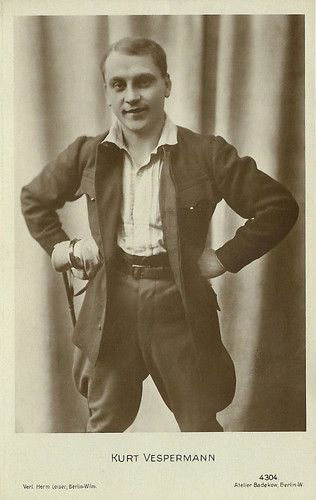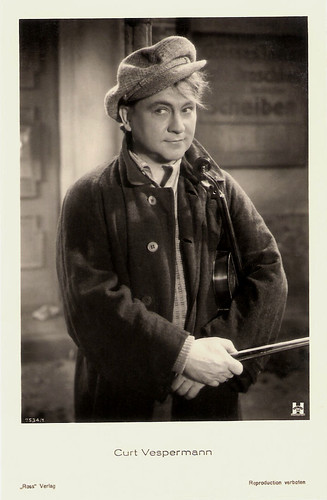German character actor Kurt Vespermann (1887-1957) was active in nearly 200 films between 1915 and 1957.

German postcard by Verlag Hermann Leiser, Berlin-Wilm., no. 4304. Photo: Atelier Badekow, Berlin-W. Collection: Didier Hanson.

German postcard by Ross Verlag, no. 6354/1, 1931-1932. Photo: Ufa. Olly Gebauer and Kurt (Curt) Vespermann (probably) in the musical comedy Ronny (Reinhold Schünzel, 1931).

German postcard by Ross Verlag, no. 7534/1, 1932-1933.
Kurt (sometimes Curt) Vespermann was born in Culmsee, Imperial Germany (today Chełmża, Poland) in 1887. His Great-Grandparents and grandparents had been actors, singers, and directors at different Operas and Theaters, and his parents worked for a touring company.
Vespermann began his career in 1913 at the Königlichen Schauspielhaus (Royal Theater), Berlin. From 1915 on, he also appeared in silent films as Manya, die Türkin/Manya, the Turkish (Harry Piel, 1915) with Fritz Kortner, and Im Feuer der Schiffskanonen/In the fire of naval guns (Walter Schmidthässler, 1915).
To his well-known silent films belong the Aufklärungsfilm (sex education film) Es werde Licht/Let there be light (Richard Oswald, 1917) starring Bernd Aldor, Tragödie der Liebe/Love Tragedy (Joe May, 1923) with the young Marlene Dietrich, and the Thomas Mann adaptation Die Buddenbrooks/The Buddenbrooks (Gerhard Lamprecht, 1923).
Among his other silent films were Sündenbabel (1925), Athleten/Athletes (Frederic Zelnik, 1925) starring Asta Nielsen, Der Bettelstudent/the Beggar Student (Jacob Fleck, Luise Fleck, 1927).
His final silent film was the classic Asphalt (Joe May, 1929) starring Betty Amann and Gustav Fröhlich. In most of these films he played supporting acts.

German postcard by Verlag Hermann Leiser, no. 4305. Photo: Atelier Badekow, Berlin.

German postcard in the Film Sterne series by Rotophot, no. 525/6. Photo: Messter-Film, Berlin. Henny Porten and Kurt Vespermann in Das Geschlecht derer von Ringwall (Rudolf Biebrach, 1918).

German postcard by Photochemie, Berlin, no. K. 2750. Photo: Atelier Max Welten, Berlin.
Kurt Vespermann made a smooth transition to sound film. He appeared successfully in supporting parts in the musical comedy Ronny (Reinhold Schünzel, 1931) featuring Käthe von Nagy, the crime drama Schuss im Morgengrauen/A Shot at Dawn (Alfred Zeisler, 1932) with Ery Bos, and the comical thriller Die Welt ohne Maske/The World Without a Mask (Harry Piel, 1934)
He also appeared in the popular musical Es war eine rauschende Ballnacht/It Was a Gay Ballnight (Carl Froehlich, 1939) starring Marika Rökk.
After the war, he played many age roles, which made him known to the public again.
In these years he played in the crime drama Schwarze Augen/Dark Eyes (Géza von Bolváry, 1951) starring Cornell Borchers, the Grimm Brothers fairytale König Drosselbart/King Thrushbeard (Herbert B. Fredersdorf, 1954), and the romantic drama Wie einst Lili Marleen/Like Once Lili Marleen (Paul Verhoeven, 1956) starring Adrian Hoven
He also appeared in the cross-dressing comedy Viktor und Viktoria/Viktor and Viktoria (Karl Anton, 1957). His final film was the daring homosexual drama Anders Als du und Ich/The Third Sex (Veit Harlan, 19576) with Christian Wolff.
In 1953 Germany honored him with the Verdienstkreuz (Cross of merit). Kurt Vespermann died in 1957 in Berlin. He was married to actress Lia Eibenschütz. Their son Gerd Vespermann (1926-2000) continued the family tradition and also became a successful actor, especially in the 1950s and 1960s.

German postcard by Ross Verlag, no. 3028/1, 1928-1929. Photo: Suse Byk, Berlin.

German postcard by Ross Verlag, no. 3556/1, 1928-1929. Photo: Atelier Schneider, Berlin.

German postcard by Ross Verlag, no. 5572/1, 1930-1931. Photo: Paramount Pictures.
Sources: Thomas Staedeli (Cyranos), Wikipedia (German and English), and IMDb.
This post was last updated on 23 March.

German postcard by Verlag Hermann Leiser, Berlin-Wilm., no. 4304. Photo: Atelier Badekow, Berlin-W. Collection: Didier Hanson.

German postcard by Ross Verlag, no. 6354/1, 1931-1932. Photo: Ufa. Olly Gebauer and Kurt (Curt) Vespermann (probably) in the musical comedy Ronny (Reinhold Schünzel, 1931).

German postcard by Ross Verlag, no. 7534/1, 1932-1933.
Aufklärungsfilm
Kurt (sometimes Curt) Vespermann was born in Culmsee, Imperial Germany (today Chełmża, Poland) in 1887. His Great-Grandparents and grandparents had been actors, singers, and directors at different Operas and Theaters, and his parents worked for a touring company.
Vespermann began his career in 1913 at the Königlichen Schauspielhaus (Royal Theater), Berlin. From 1915 on, he also appeared in silent films as Manya, die Türkin/Manya, the Turkish (Harry Piel, 1915) with Fritz Kortner, and Im Feuer der Schiffskanonen/In the fire of naval guns (Walter Schmidthässler, 1915).
To his well-known silent films belong the Aufklärungsfilm (sex education film) Es werde Licht/Let there be light (Richard Oswald, 1917) starring Bernd Aldor, Tragödie der Liebe/Love Tragedy (Joe May, 1923) with the young Marlene Dietrich, and the Thomas Mann adaptation Die Buddenbrooks/The Buddenbrooks (Gerhard Lamprecht, 1923).
Among his other silent films were Sündenbabel (1925), Athleten/Athletes (Frederic Zelnik, 1925) starring Asta Nielsen, Der Bettelstudent/the Beggar Student (Jacob Fleck, Luise Fleck, 1927).
His final silent film was the classic Asphalt (Joe May, 1929) starring Betty Amann and Gustav Fröhlich. In most of these films he played supporting acts.

German postcard by Verlag Hermann Leiser, no. 4305. Photo: Atelier Badekow, Berlin.

German postcard in the Film Sterne series by Rotophot, no. 525/6. Photo: Messter-Film, Berlin. Henny Porten and Kurt Vespermann in Das Geschlecht derer von Ringwall (Rudolf Biebrach, 1918).

German postcard by Photochemie, Berlin, no. K. 2750. Photo: Atelier Max Welten, Berlin.
Age Roles
Kurt Vespermann made a smooth transition to sound film. He appeared successfully in supporting parts in the musical comedy Ronny (Reinhold Schünzel, 1931) featuring Käthe von Nagy, the crime drama Schuss im Morgengrauen/A Shot at Dawn (Alfred Zeisler, 1932) with Ery Bos, and the comical thriller Die Welt ohne Maske/The World Without a Mask (Harry Piel, 1934)
He also appeared in the popular musical Es war eine rauschende Ballnacht/It Was a Gay Ballnight (Carl Froehlich, 1939) starring Marika Rökk.
After the war, he played many age roles, which made him known to the public again.
In these years he played in the crime drama Schwarze Augen/Dark Eyes (Géza von Bolváry, 1951) starring Cornell Borchers, the Grimm Brothers fairytale König Drosselbart/King Thrushbeard (Herbert B. Fredersdorf, 1954), and the romantic drama Wie einst Lili Marleen/Like Once Lili Marleen (Paul Verhoeven, 1956) starring Adrian Hoven
He also appeared in the cross-dressing comedy Viktor und Viktoria/Viktor and Viktoria (Karl Anton, 1957). His final film was the daring homosexual drama Anders Als du und Ich/The Third Sex (Veit Harlan, 19576) with Christian Wolff.
In 1953 Germany honored him with the Verdienstkreuz (Cross of merit). Kurt Vespermann died in 1957 in Berlin. He was married to actress Lia Eibenschütz. Their son Gerd Vespermann (1926-2000) continued the family tradition and also became a successful actor, especially in the 1950s and 1960s.

German postcard by Ross Verlag, no. 3028/1, 1928-1929. Photo: Suse Byk, Berlin.

German postcard by Ross Verlag, no. 3556/1, 1928-1929. Photo: Atelier Schneider, Berlin.

German postcard by Ross Verlag, no. 5572/1, 1930-1931. Photo: Paramount Pictures.
Sources: Thomas Staedeli (Cyranos), Wikipedia (German and English), and IMDb.
This post was last updated on 23 March.
No comments:
Post a Comment